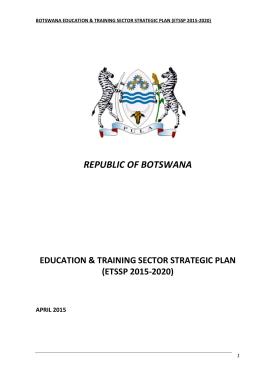Botswana - Education & Training Sector Strategic Plan (ETSSP 2015-2020)
Botswana - Education & Training Sector Strategic Plan (ETSSP 2015-2020)
The ETSSP sets out many of the challenges facing the education sector and the varied strategies, programmes and activities to meet the challenges. The strategic plan identifies areas of priority in order to focus resources in an efficient and effective manner on those areas in the education sector that will contribute most in enhancing the quality of learning at the different levels in the education system. It also presents the indicative costs of the planned activities and indication of sub-sector priority actions. To manage this, Annual Implementation Plans will be developed by MoESD and the regional offices.
The sub-sector strategies have been derived from a series of situational analysis done for each of the sub-sectors and thematic working groups supported by international and local consultants. Each of the development teams were supported and advised by a consultative body of key stakeholders relevant to their area of review. In addition, the development of the sub-sectors was subject to review and feedback from the NDP-10/11 thematic working groups, including representatives from: the public sector, the unions, the private sector, civil society and the development partners.
Importantly, ETSSP is developed in conjunction with other major government reforms. The MoESD is working closely with the Ministry of Finance and Development Planning (MFDP) and the development of the MTEF and the Ministry of Local Government and Rural Development (MLGRD), Ministry of Health (MoH), the Ministry of Labour and Home Affairs (MoLHA). It is aligned with the government’s public sector reform programme (PSR) and a major goal to develop a lean public service through its human resource management and public service reforms. Thus, reforms will be put in place for a Ministry of Education and Skills Development that are much more orientated towards focusing on policy, strategic planning and resource allocation, decentralisation, coordination, standards setting, and monitoring and evaluation.

